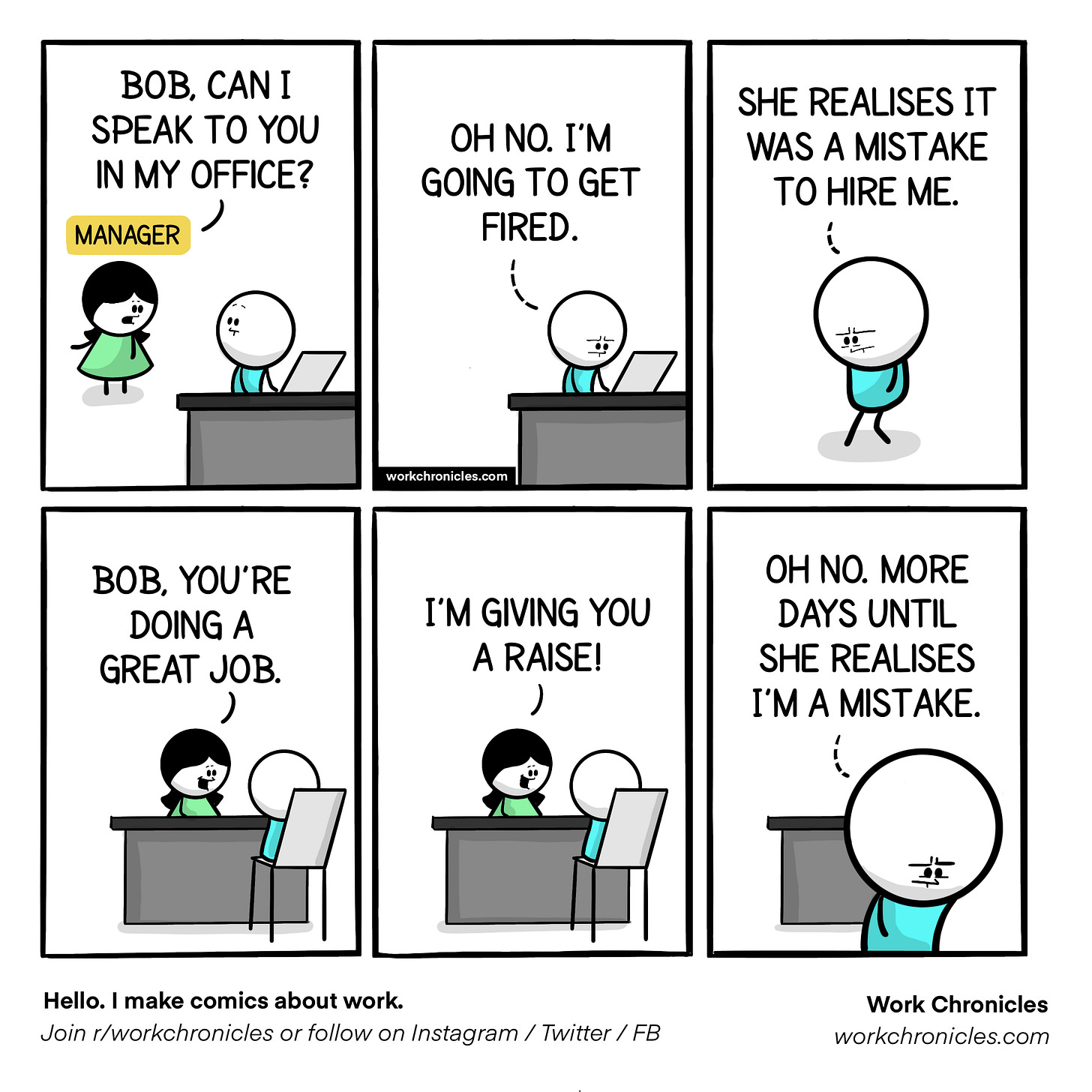Working through Imposter Syndrome
Keep your eyes on the prize and accept failure as a cost of admission
Working through Imposter Syndrome
If you’re a high achiever, particularly one who:
is relatively new to their line of work, and
tends to be hardworking, thoughtful, and successful
… it’s likely you struggle to give yourself the benefit of the doubt and treat yourself with compassion. And that can often result in the dreaded Imposter Syndrome — in other words: feeling like a fraud and doubting one’s own abilities even in the face of overwhelming evidence of competence.
It can lead you to feel like a literal imposter; you somehow tricked your employer into hiring you, bamboozled your colleagues into giving you their respect and holding you in high esteem. You don’t believe you deserve either of those things and a fear of being “found out” as a result.

Know Thy Character
Fortunately, you’re not alone. The constant chip-on-your-shoulder mentality afflicts high performers everywhere, which means there are a ton of designers who can empathize and help surface some blind spots in your own personality and behavior.
In this post on identifying and overcoming Imposter Syndrome, Jesse Prehodick lays out the how your lack of self-esteem can manifest as a number of avatars:
The Perfectionist — you might be aiming for perfect over done at all, and fail to deliver as a consequence
The Superwoman or man — heroic efforts to work harder to compensate when you feel you’re not as valuable as those around you
The Genius — you think that if you work hard at something and fail, it might mean you’re not actually talented with this skillset
The Individualist — you avoid help from others, because competent people don’t need help (spoiler alert: they totally do)
The Expert — you’re constantly taking classes and trying to level up to make sure no one finds out you don’t actually know anything
Chances are, you fall into one or two of these categories. Jesse suggests a handful of solutions that apply across the aforementioned Imposter characters. In short: understand that your Imposter Syndrome is valid and that others experience it too; opening up and being transparent about it might help you and your peers support one another.
Just keep swimming!
Stay focused on the work
Imposter Syndrome isn’t a thing that you can take a pill for — it’s typically an ongoing struggle, especially as you grow and improve within your craft. It takes frequent and consistent acts of courage to keep moving forward, delivering value, and building your confidence over time.
In our recent interview with Brian Hershberger, Global Digital Product Designer at Nike, we discussed the pitfalls of Imposter Syndrome at work, and how to deal with it on an ongoing basis.
Brian’s advice is pretty straightforward. Stay focused on the work, delivering good work, ad developing ancillary skillsets along the way.
I have [Imposter Syndrome] every day. It doesn’t ever fully go away. It does sometimes subside and that generally happens when I find myself digging into the work, building stuff, and getting out of my own head of “whether [my work] is good or not.”
…Just start working and creating stuff. That’s kind of how I’ve always gotten through that.
Strategically build up your confidence
In his recent post titled Confidence in creativity is not given; It is earned, Hoang Nguyen gives us a stellar framework on what it takes to build a sense of grounded, well-informed confidence.
Begin a healthy relationship with what others think
We start with the assumption that belief in ourselves takes the form of the Social or the Personal.
Both internal and external validation are signals that you’re doing the right thing, which is why it’s incredibly important to know when those signals serve you well, and when they don’t. Because creatives tend to be a bit more sensitive, stop worrying about being judged. Be open to judgment and criticism, and don’t avoid the harsh light of critique.
Stay humble
Humility comes in two forms here:
Fail — early and often. It’s a crucial part of your growth as a designer, but also as a human.
Don’t shun small wins — don’t look down at inelegant solutions just because they’re not the sexiest things you could come up with.
Get comfortable failing. A lot. You need reps to know what you’re good at, and to ultimately be comfortable taking more risks. The fear of failure will keep you from pursuing the chances worth taking.
Also worth noting that your job as a problem solver doesn’t mean every solution has to be yours. Don’t reinvent the wheel when you don’t have to — if you’re trying to solve a problem and tend to be the kind of person who wants to ship their very own, never-before-done Big Idea… well, chances are you’re not going to get something done.
Hope you found these insights useful! Subscribe for more Design Career digests and hot takes on the weekly. And please share widely.


